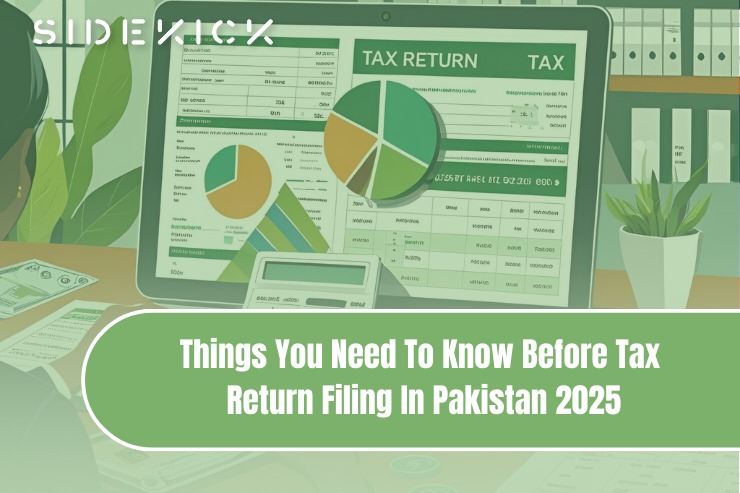Tax return filing in Pakistan is more than a citizen’s civic responsibility. This legal duty is directly linked to your financial credibility and access to services. Whether you are a salaried person, entrepreneur, freelancer, or large business owner, this article explains in detail how to file your tax return smoothly using FBR’s IRIS portal for the tax year 2025. This article will not only help you in filing your income tax return but will also allow you to keep your status active on the Active Taxpayer List (ATL) to avoid further penalties.
Tax Return Filing Process in 2025
An Income tax return must be filed electronically on the e-portal of the FBR IRIS. To file a FBR tax return, it is crucial to get registered for income tax. FBR has provided online registration services for individuals. However, for companies and associations of persons, a personal visit to the facilitation center is mandatory. Once the registration process is complete, you get your NTN number which can be used as your login ID for the IRIS portal (https://iris.fbr.gov.pk/) or your CNIC can also be used to fulfill the purpose. In July 2025, the new forms of return were announced by the FBR via SRO 1212, also released online versions of the digital returns of non-residents who did not have any local income. Although due dates are legally set, the usual last tax return filing date is September 30 – in case of failure in compliance, a penalty in the form of a fine and voiding of filer status will be implemented.
Essential Documents
The required documents are CNIC, salary certificates, profit and loss statements of businesses, wealth statement, withholding tax certificates of banks and telecoms, rent certificates, and electricity bills.
Significance of wealth Statement in Filing Tax Return
A wealth statement is important in your taxation process as it provides a present picture of your wealth. It is a legal requirement of the annual income tax submission process under the FBR statutes and is filed on the IRIS portal. It is a common misunderstanding that only business owners are required to file a wealth statement. However, under Pakistan tax rules, it is necessary to submit a wealth statement for various salaried and business individuals.
Refer to the following chart for wealth statement filing requirement:
| Type | Requirement of wealth statement | Note |
| Salaried individual (taxable) | Yes | If exceeds the income threshold. |
| Non-resident (property owner) | Yes | If a person has property and is a local income earner. |
| Taxpayer with assets | Yes | If a person has no income but assets, filing of a wealth statement is necessary under Section 116. |
| Small business owner | Yes | Registered taxpayers, irrespective of income, are required to submit a wealth statement. |
Who has to file a Tax Return?
Following is a chart to assist you whether you are liable to file a tax return:
| Category | Need to file? |
| Salaried individual (if exceeds threshold) | Yes |
| Freelancer or Business owner | Yes |
| NTN holder (even if the income is zero) | Yes |
| Property owner | Yes |
| Overseas Pakistani (having local income) | Yes |
Step-by-Step Guide for Tax Return Filing
1. Login through your CNIC or NTN on the IRIS portal by using the link
2. Click on “Income Tax Return” and select the appropriate tax year
3. Fill the mandatory tabs according to given chart:
| Tab | Filer | What should be mentioned |
| Employment | Salaried person | NTN of the employer, withheld tax, and details of salary |
| Business | Business/ Freelancers | Revenue, profit/loss, expenditure |
| Property | Owners of property, landlords | Paid taxes, income from rent, value of property |
| Capital Gains | Investors | Capital profit/loss from shares, real estate |
| Other Sources | All filers | Foreign income, interest from the bank, etc. |
| Tax Credits | All filers | Aids, Zakat, pension contribution, insurance |
| Assets/ Liabilities | Businesses and Individuals | Loans, property, cash, vehicles, gold |
4. Confirm your entries, compute your tax, and file to get an official acknowledgement receipt from FBR.
5. If tax is payable, create a payment slip ID (PSID) and make payment through bank or mobile/internet banking.
Confused about Tax Deadlines in Pakistan for 2025?
Get in Touch
Fill out the form below, and we will be in touch shortly.
Tax Return Check Online
Once you file an income tax return, you can utilize tax return services and check your status as a taxpayer. Click Here. You can check your filing status by entering your NTN or CNIC.
Dos and Don’ts to File Tax Return Smoothly in Pakistan
1. Don’t wait for the last date to file a tax return. File your return before the deadline to avoid last-minute technical issues.
2. Save both digital and hard copies of acknowledgements and receipts as a backup for future reference.
3. Consult with a certified, experienced tax professional if the need arises.
4. Prefer using a browser on a laptop for a hassle-free experience.
Experience Smooth Tax Return Process with the Help of Sidekick
If it feels overwhelming to you to file your income tax return, manage all the documents and calculations for your wealth statement, and keep track of income tax due dates, Sidekick, as a professional and experienced income tax service provider got you covered. Sidekick provides all variety of tax compliance tools that are specifically designed to match the latest tax filing landscape. They offer personalized assistance and guidance on income tax reporting, proper record maintenance, and ensure timely submission of income tax returns, supervised by their well-qualified tax staff. As an individual or business, Sidekick guides you through the complexities of the IRIS, handles reconciliation of withholding certificates, and keeps you on track according to the requirements of filing the latest income tax return, thus enabling you to file your tax with accuracy and ease.
Conclusion
Tax season does not have to be a nightmare for people, as IRIS, with the user-friendly portal and navigable guidelines makes the experience of tax return filing smooth and seamless. By gathering the required documents, submitting before the deadline, and by recording the right information and using digital tools, non-compliance and consequent penalties can be avoided.







